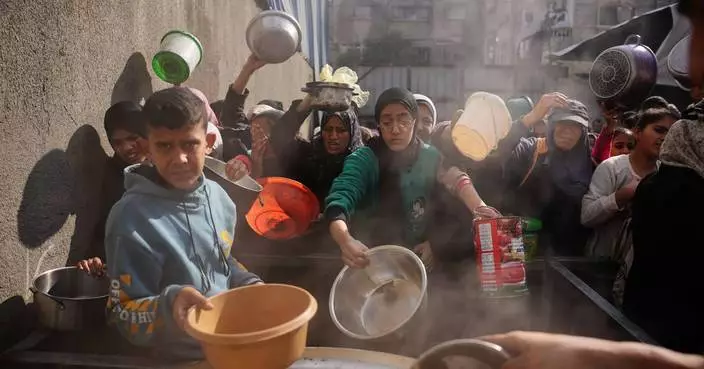Feature · News

Foggy, icy weather forces road closure in northern China

Chinese researchers complete 2nd successful case in invasive brain-computer interface trial in Shanghai

The Funeral with Full Honours for the Sacrificed Fireman Ho Wai-ho in the Tai Po Fire

Chinese representatives to China-Russia Friendship Committee for Peace and Development hold plenum in Beijing

Young conservative women find a home in Turning Point with Charlie Kirk's widow at the helm

Gazans race to preserve cultural heritage after two years of war

All rebuilt houses in Xizang quake-affected zone handed over to residents

China promotes use of homegrown police dog breed

China requests WTO consultations with India over tariffs on ICT products, photovoltaic subsidies

China calls for political transition, stresses zero-tolerance for terrorism in Syria

Trump suspends green card lottery program that let Brown University, MIT shootings suspect into US

What to know about the man authorities say fatally shot 2 Brown students and an MIT professor

Trump announces lower drug price deals with 9 pharmaceutical companies
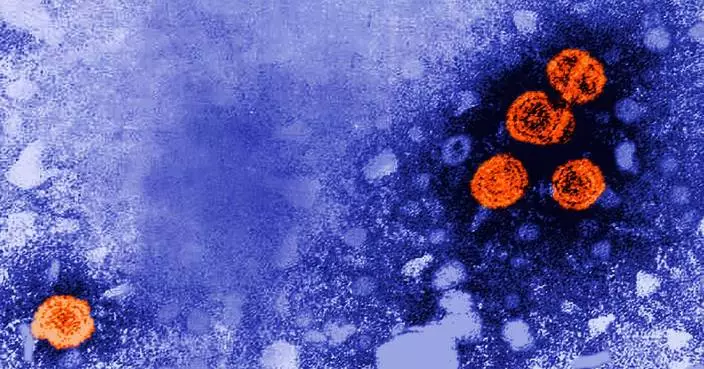
US awards no-bid contract to Denmark scientists studying hepatitis B vaccine in African babies

A little-known diversity visa program is paused after the Brown University shooting

Wisconsin Republicans demand Judge Dugan resign or face impeachment after felony conviction
All rebuilt houses in Xizang quake-affected zone handed over to residents
China promotes use of homegrown police dog breed
China requests WTO consultations with India over tariffs on ICT products, photovoltaic subsidies
China calls for political transition, stresses zero-tolerance for terrorism in Syria
Foggy, icy weather forces road closure in northern China
Chinese researchers complete 2nd successful case in invasive brain-computer interface trial in Shanghai
The Funeral with Full Honours for the Sacrificed Fireman Ho Wai-ho in the Tai Po Fire
Chinese representatives to China-Russia Friendship Committee for Peace and Development hold plenum in Beijing

Young conservative women find a home in Turning Point with Charlie Kirk's widow at the helm
Gazans race to preserve cultural heritage after two years of war

Trump suspends green card lottery program that let Brown University, MIT shootings suspect into US

What to know about the man authorities say fatally shot 2 Brown students and an MIT professor

Trump announces lower drug price deals with 9 pharmaceutical companies

US awards no-bid contract to Denmark scientists studying hepatitis B vaccine in African babies

A little-known diversity visa program is paused after the Brown University shooting

Wisconsin Republicans demand Judge Dugan resign or face impeachment after felony conviction
Feature·Bloggers

【What Say You?】Unfinished business With the “anti-Hong Kong triangle”?

【Bastille Commentary】UK's Hypocrisy on Display: Seizing Private Assets While Preaching Freedom

【What Say You?】London’s Selective Memory on National Security

【What Say You?】The “Shina-Implosion” Playbook Behind Jimmy Lai

【Ariel】Insider Breaks Silence: 2019 Was Orchestrated — And He Names Who Pulled the Strings

【InsightSpeak】The executive–legislative relationship under a new electoral culture

Luigi Mangione‘s lawyers say Bondi’s death penalty decision was tainted by conflict of interest
- Trump administration restricts 2 Honduran election officials' visas over special vote count
- NORAD continues decades-long tradition of tracking Santa's trip around the world
- Prisoners freed by Belarus say their passports are taken away in a final 'dirty trick' by officials
- Christmas spirit returns to Bethlehem after ceasefire in Gaza
- How surveillance technology and the 'Reddit Detective Agency' helped search for a killer
- PHOTO ESSAY: Under watch by Chinese tech, the Tibetan community in Nepal is slowly suffocating
- Artist's battlefield collection captures the lived experience of Ukraine's resistance to invasion
- US military launches strikes in Syria targeting Islamic State fighters after American deaths
- Takeaways from the US Justice Department's initial release of Epstein files, mandated by Congress

Somalia-China cooperation expanding across sectors: Somali president
- Belgian public backs gov't stance against using Russian assets to aid Ukraine
- Promotional meeting showcases deep integration of tourism, films in China
- Israeli airstrikes in southern, northern Gaza kill at least 10
- Somali President praises Xi's leadership, support for Somali security
- China-Somalia ties mature, based on mutual respect, integrity: Somali president
- Hainan tourism consumption gains leapfrog growth
- UN chief urges "truly durable" ceasefire with unimpeded humanitarian access for Gaza
- U.S. consumer sentiment rises slightly in December: survey
- Guterres urges deescalation, calling for dialogue on Venezuela

Shanghai Electric Powers Up Iraq's Energy Future with Major 625MW Efficiency Upgrade
- The US Treasury wants more states to embrace Trump's tax cuts. So far, only a few have done so
- Minnesota jury says Johnson & Johnson owes $65.5 million to woman with cancer who used talcum powder
- One Universal Production Group (OUP) Officially Opens, Reinforcing Its Position as Asia's Leading IP Ecosystem and Tourism Company
- FITUR 2026: Promoting Japan's Tourism Appeal to the International Market
- SIM Introduces CareerSense, an AI-Based Career Guidance Platform for Students
- Trump administration wants to ensure Mexican crews operating trains in the US can speak English
- Tesla CEO Elon Musk recovers $55 billion pay package in Delaware court ruling
- Key questions about Minnesota's fraud schemes and the billions in losses
- Implosion takes down a nearly century-old Mississippi River bridge

PHOTO ESSAY: Invisible infrared surveillance technology and those caught in its digital cage
- Mystery as YouTube creator's finance livestream appears on White House website
- Hypothermia claims newborn in Gaza and more babies are at risk, doctor says
- LOCALIZE IT: Recipients on the list of 2025's biggest philanthropic gifts based in several states
- Ford recalls more than 270,000 electric and hybrid vehicles due to roll-away risk
- These are Americans' biggest priorities for the government in 2026, according to a new AP-NORC poll
- The shortest day of the year is descending on the Northern Hemisphere. Here's what to know
- Thailand conference launches international initiative to fight online scams
- TikTok signs deal to form new US unit with investors, including Oracle, Silver Lake
- Speaker Johnson was ready to move on from ACA subsidies. But his members had other plans

LOCALIZE IT: Marching bands, equestrian units from several states featured in Rose Parade on Jan. 1
- The Kennedy Center has added Trump's name to the memorial Congress created for John F. Kennedy
- Judge nixes conviction of 1 of 2 men found guilty of killing Run-DMC's Jam Master Jay
- Oscar contender ‘The Secret Agent’ capitalizes on the rise of Brazilian cinema
- Pete Davidson and Elsie Hewitt welcome their 'perfect angel girl'
- Sony buys a majority stake in the 'Peanuts' comic for $457 million from Canada's WildBrain
- '6-7,' Dubai chocolate, Labubu: You took 2025, now scat!
- Trump gave an unusually partisan White House address. Should networks have given him the TV time?
- Louvre reopens fully after staff vote to suspend strike
- Photos show a world aglow with holiday lights

Rams' latest narrow defeat could be difference in whether or not they secure top seed in NFC
- Anthony Joshua knocks out Jake Paul in 6th round to win heavyweight fight
- Blue Jackets add veteran toughness in acquiring forward Mason Marchment in trade with Kraken
- Robertson has 2 goals and assist as Stars beat Ducks 8-3 for 3rd straight win
- Alabama rallies from 17-point deficit to beat Oklahoma 34-24 in College Football Playoff
- Timberwolves hand the Thunder their 3rd loss, 112-107, after Edwards takes over down the stretch
- Noesen and Brown score goals as Devils beat Mammoth 2-1 for 3rd win in 4 games
- Timberwolves coach Chris Finch gets ejected in first quarter for officiating complaints vs. Thunder
- Burns, Necas give Avalanche early lead in 3-2 win over Jets for 12th straight home win
- Joe Root and Zac Crawley keep England's Ashes hopes alive on Day 4

New Police Graduates Urged to Be Guardians of Peace in Hong Kong
- Customs Seizes Illegal Kitten Imported into Hong Kong, Arrests Suspect at Control Point
- Hong Kong Pavilion Showcases Comics at Comic Fiesta 2025 in Kuala Lumpur, Promoting Cultural Exchange and Collaboration.
- Government Approves MTRCL to Design South Island Line (West) for Improved Transit in Hong Kong.
- Independent Committee Begins Work on Wang Fuk Court Fire Relief and Support Efforts
- Hong Kong Customs Seizes $10.9 Million in Drugs at Airport and Tsim Sha Tsui, Arrests Two Suspects.
- Government Intervenes to Appoint Temporary Manager for Wang Fuk Court Amid Management Issues
- Hong Kong Immigration Department Arrests 34 in Anti-Illegal Worker Operations
- Hong Kong and Vietnam Discuss Strengthening Economic Cooperation and Trade Relations
- Hong Kong Extends 28 Land Leases for 50 Years Without Additional Premiums

Russia claims multiple cluster strikes against Ukraine, Ukraine reports repelling Russian offensives
- U.S. stocks close higher
- U.S. dollar ticks up
- Crude futures settle higher
- Chancay-Shanghai shipping route moves goods worth over 5.5 billion yuan
- Hainan FTP to enhance regional, global trade cooperation: int'l observers
- Hainan FTP logs smooth cargo flows on 1st day of special customs operations
- Hainan's island-wide customs operations to boost China's high-level opening: commentary
- Border tensions drain tourists from Thailand's Trat Province
- China launches high-altitude cavern intelligent computing center
Category · News

Luigi Mangione‘s lawyers say Bondi’s death penalty decision was tainted by conflict of interest

Trump administration restricts 2 Honduran election officials' visas over special vote count
NORAD continues decades-long tradition of tracking Santa's trip around the world

Rams' latest narrow defeat could be difference in whether or not they secure top seed in NFC

Somalia-China cooperation expanding across sectors: Somali president

Anthony Joshua knocks out Jake Paul in 6th round to win heavyweight fight

Blue Jackets add veteran toughness in acquiring forward Mason Marchment in trade with Kraken
Belgian public backs gov't stance against using Russian assets to aid Ukraine

Robertson has 2 goals and assist as Stars beat Ducks 8-3 for 3rd straight win

Promotional meeting showcases deep integration of tourism, films in China

Alabama rallies from 17-point deficit to beat Oklahoma 34-24 in College Football Playoff

Timberwolves hand the Thunder their 3rd loss, 112-107, after Edwards takes over down the stretch
Israeli airstrikes in southern, northern Gaza kill at least 10

New Police Graduates Urged to Be Guardians of Peace in Hong Kong
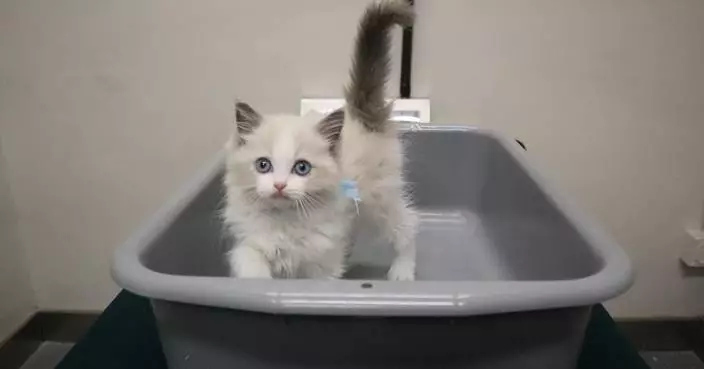
Customs Seizes Illegal Kitten Imported into Hong Kong, Arrests Suspect at Control Point

Prisoners freed by Belarus say their passports are taken away in a final 'dirty trick' by officials
Somali President praises Xi's leadership, support for Somali security

Noesen and Brown score goals as Devils beat Mammoth 2-1 for 3rd win in 4 games

Christmas spirit returns to Bethlehem after ceasefire in Gaza

How surveillance technology and the 'Reddit Detective Agency' helped search for a killer

PHOTO ESSAY: Under watch by Chinese tech, the Tibetan community in Nepal is slowly suffocating
China-Somalia ties mature, based on mutual respect, integrity: Somali president

Artist's battlefield collection captures the lived experience of Ukraine's resistance to invasion

Timberwolves coach Chris Finch gets ejected in first quarter for officiating complaints vs. Thunder

Burns, Necas give Avalanche early lead in 3-2 win over Jets for 12th straight home win
Hainan tourism consumption gains leapfrog growth

Shanghai Electric Powers Up Iraq's Energy Future with Major 625MW Efficiency Upgrade

Joe Root and Zac Crawley keep England's Ashes hopes alive on Day 4

Hong Kong Pavilion Showcases Comics at Comic Fiesta 2025 in Kuala Lumpur, Promoting Cultural Exchange and Collaboration.

Victor Wembanyama records 100th straight game with at least one block, joining elite company

Panthers, down 3-0 in the third, stun Hurricanes and win in shootout, 4-3
UN chief urges "truly durable" ceasefire with unimpeded humanitarian access for Gaza

US military launches strikes in Syria targeting Islamic State fighters after American deaths
U.S. consumer sentiment rises slightly in December: survey
Guterres urges deescalation, calling for dialogue on Venezuela

Buzelis and Vucevic score 24 apiece to lead Bulls to 136-125 victory over short-handed Cavaliers

Takeaways from the US Justice Department's initial release of Epstein files, mandated by Congress

Kiefer Sherwood has hat trick as Canucks beat Islanders 4-1 for 3rd straight win

NBA official Tre Maddox suffers leg injury during Bulls-Cavaliers game

LOCALIZE IT: Marching bands, equestrian units from several states featured in Rose Parade on Jan. 1

Maxey, Edgecombe help the 76ers hand the Knicks their second home loss of the season

The US Treasury wants more states to embrace Trump's tax cuts. So far, only a few have done so
Russia claims multiple cluster strikes against Ukraine, Ukraine reports repelling Russian offensives

Justice Department releases limited set of files tied to Epstein sex trafficking investigation

Victor Wembanyama leads Spurs to a 126-98 win against Hawks with 26-point performance

Trump insists during NC visit he's brought down costs, but residents say they're feeling squeezed

Minnesota jury says Johnson & Johnson owes $65.5 million to woman with cancer who used talcum powder
U.S. stocks close higher
U.S. dollar ticks up

Derrick White scores season-high 33, hits nine 3s as Celtics pull away from Heat 129-116
Crude futures settle higher

Rep. Elise Stefanik ends her campaign for New York governor and won't seek reelection to House

The Latest: Justice Department releases some case files on Jeffrey Epstein

Anthony Edwards returns for the T-wolves to face the Thunder after 3-game absence with foot soreness

Government Approves MTRCL to Design South Island Line (West) for Improved Transit in Hong Kong.

Germany's Julia Taubitz wins World Cup women's luge, American sliders take next 3 spots
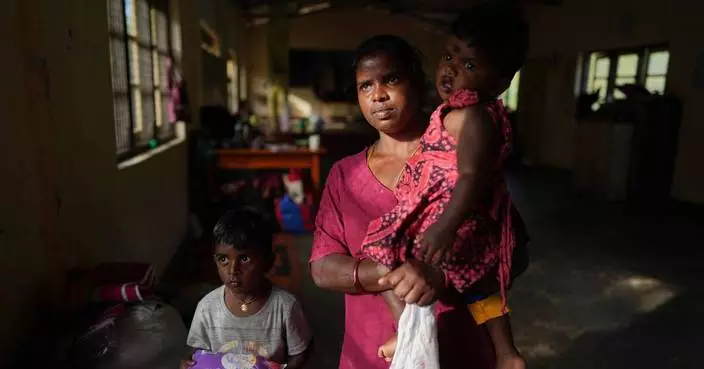
Sri Lanka tea workers struggle in poverty. Flooding cost many their lives

In Antarctica, photos show a remote area teeming with life amid growing risks from climate change

One Universal Production Group (OUP) Officially Opens, Reinforcing Its Position as Asia's Leading IP Ecosystem and Tourism Company

Brown University attack suspect died 2 days before his body was found, autopsy finds

Blake Griffin, Candace Parker among the first-time nominees for Basketball Hall of Fame

Los Angeles Dodgers to pay record $169 million luxury tax after winning 2nd straight World Series
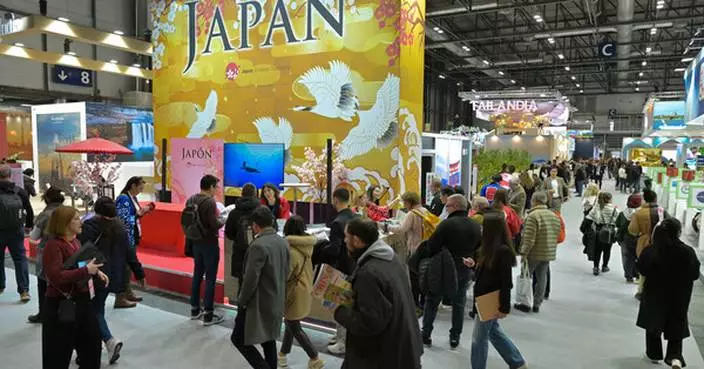
FITUR 2026: Promoting Japan's Tourism Appeal to the International Market

SIM Introduces CareerSense, an AI-Based Career Guidance Platform for Students

Vikings shut down left tackle Christian Darrisaw for the rest of the season as knee trouble lingers

Texas Rangers and reliever Chris Martin finalize 1-year contract

Allen, Bills look to clinch 7th straight playoff berth as Browns' Garrett goes for NFL sacks record

Knicks celebrate their NBA Cup title, even though they aren't commemorating it with a banner

Trump administration wants to ensure Mexican crews operating trains in the US can speak English

Forecasters issue rare weather warning as strong gusts fuel wildfire threats in Colorado

NTSB unclear who was at controls in jet crash that killed ex-NASCAR driver Greg Biffle and 6 others

Los Angeles Angels settle lawsuit with family of pitcher Tyler Skaggs over fatal overdose

Tesla CEO Elon Musk recovers $55 billion pay package in Delaware court ruling

Texas judge orders Attorney General Ken Paxton's divorce records unsealed amid heated Senate primary

NBA tweaks its injury reporting rules, still wants changes to prop betting

Head of group suing over White House ballroom says she trusts Trump-picked chairman to do his job

The Kennedy Center has added Trump's name to the memorial Congress created for John F. Kennedy

Judge nixes conviction of 1 of 2 men found guilty of killing Run-DMC's Jam Master Jay

A timeline of the Jeffrey Epstein investigation and the fight to make the government’s files public

Orioles acquire RHP Shane Baz in trade from Tampa Bay for 4 minor leaguers and a draft pick

Eichel and Theodore out for Golden Knights' Canadian road trip

Immelman says how LIV Golf fills its roster is part of discussion toward getting ranking points

Geno Smith returns to start for Raiders against Texans' top-ranked defense

Chicago boosts transit police presence after renewed federal funding cut threat over crime





